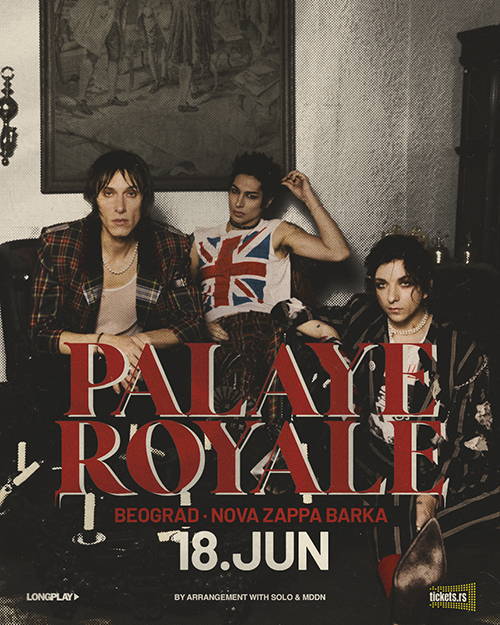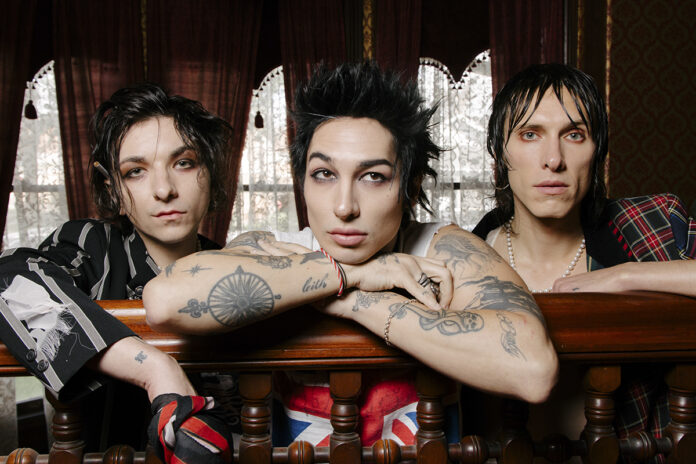When we think of Las Vegas, we picture something grand, dazzling. Often oversaturated, over the top, overwhelming—or simply too loud. We imagine it through the lens of movies and books. There’s always a neon sign in the background.
It was in that very Las Vegas, back in 2008, that a band was born—one that perfectly embodies the aforementioned version of the city. It almost feels like 2008 was yesterday, because their energy, nearly two decades later, hasn’t faded in the slightest. If anything, they seem to grow younger with each passing year. Back then, they were known as Kropp Circle. By 2011, they became what we know and love today—Palaye Royale.
They were kids in 2008. Still kids in 2011. And what truly sets them apart—beyond the music, the fashion, the audacity—is that they never stopped being kids. They never once thought of losing themselves in the noise.
Not long ago, this endlessly charming, colorful, flamboyant family band sat down with us for an interview—one of those rare conversations where the mask slips and the world they’ve built feels close enough to touch. They offered us a glimpse into their chaos, warmth, and wonder.
Last year was your first time in Serbia, when you played at Arsenal Fest. Now you’re back with a full solo show as headliners. What kept you from coming sooner, especially with so many Serbian fans following you all over Europe?
– Time is a peculiar thief. We’ve always wanted to return sooner, but the world pulls you in every direction when you live like a circus of sound and vision. Serbia left a mark on us its electricity, the souls we met. The delay wasn’t from lack of desire but from the spiraling dance of fate and touring chaos. Now, we return with reverence.
How would you describe your style in one word, encompassing music, personal expression, fashion, appearance, and everything in between?
– Palaye.
What does it mean to you, and does it even make sense when someone labels your music as “fashion art rock”?
–Labels are coffins for something that is meant to be alive and ever-changing. But if they must name it something, “fashion art rock” is as close as words can get to what we are a canvas of controlled chaos, elegance and rebellion stitched together in silk and sound.
We know that the name Palaye Royale carries deep meaning and personal symbolism, as did your original name, Kropp Circle. Still, what led to the decision to change it? Was it a creative shift, a statement, or something more personal?
– Kropp Circle was childhood; Palaye Royale is our forever. One was the skeleton, the other the spirit. The name change was a ritual—like burning old pages to write new. It was never just a rebrand, but a rebirth.
How much time, effort, and planning goes into maintaining your unique look and presence—or did it all come naturally, considering how authentic and one-of-a- kind you are even off stage?
– To be honest, it’s less about planning and more about living. This is simply how we exist—inside a dream stitched together by imagination, old cinema, and romantic despair. We don’t wear costumes; we wear reflections of what we feel.
How far are you willing to go in preserving your authenticity? Are there moments when that principle is challenged, especially as you evolve as a band?
– We’ve always said we’d rather fail as ourselves than succeed as something else. The industry tests that constantly. But evolution doesn’t mean compromise. It means refining the madness without sanding down the edges. We stay sharp, even if it cuts us sometimes.
You’ve stayed true to yourselves from the first album to the latest one. The number of people listening to your music has significantly grown. What are your plans for future releases, and can you be even more “yourselves” than you already are?
– The further we go, the deeper we descend into who we truly are. The masks fall, the walls dissolve. Every album is a séance. The next one… it’s already in the works. Palaye is a never ending art project.
Emerson, how do you channel and express your creativity, from personal style and drawings to poetry, clothing design, and music?
– I see life as a collage. Whether I’m drawing, writing, or playing it’s all one long performance. The universe is a sketchbook. My job is to capture fragments of it before they disappear. Everything I do is part of the same heartbeat.
We know you’re genuine—that who you are on stage is who you are in private as well. But is that really always the case?
– I think it’s all one long performance—but not in the deceptive sense. More like… I don’t take the stage off when I leave the venue. The person you see up there is just me without hesitation. But even in silence, I’m still dreaming.
Do you choreograph your stage performance in advance, or do you just go with the flow and see what happens?
– It’s chaos choreographed by instinct. We don’t rehearse movement—we allow the music to possess us. Remington climbing scaffolding is as much a surprise to us as it is to the crowd. Each night is its own fever dream.
How do you maintain intimacy with fans as your popularity grows?
– Fame is noise. Connection is quiet. We try to stay in the quiet even though we have our internal loudness but we know stuck to the people who made this possible and continue to believe and challenge us when we are being a bit crazy. But we are open books to our fans, they are our family.
Is the attitude and confidence something that came naturally from the start, or is it something you’ve built over time?
– Confidence was born out of survival. The stage is where we learned to become who we are. We have been touring since 2015 so we only know this and this is what we love. It wasn’t handed to us—it was figured out from rejection, heartbreak and insanity.

Do you think your fans share similar traits with you?
– Our fans are reflections of our art—romantics, misfits, dreamers, outlaws of emotion. We find pieces of ourselves in their eyes and I believe they see themselves in us. That’s the real communion. Family.
Now that you’ve performed Death Or Glory live for a while, does it still feel like your best album?
– Death Or Glory is just another piece to our beautiful puzzle. Right now, we are just having fun and tightening up the nonsense. But I always believe the next thing will burn brighter—or at least stranger.
Why do you want to open a boutique hotel specifically in Budapest?
– Budapest feels like a dream half-remembered. It’s a city wrapped in velvet melancholy. A boutique hotel there wouldn’t just be a place to stay it’d be a place to feel something cinematic.
What made Wembley Arena your dream venue even before seeing it?
– It’s less about the building and more about what it symbolizes. To us, Wembley was a mirage on the horizon—a holy grail. Everyone in the world knows Wembley Arena and it is behind us and all we continue to do is dream and work our asses off. The first time we stepped inside it was as performers, not as spectators. That made it real and sacred.
When you played at Wembley, was it everything you expected? Do you have a new dream venue now?
– Wembley was a prayer answered. But dreams continue to grow. Now, I see shadows of dreams in abandoned theaters, old churches, rooftops… But one day, Palaye Royale live at the Palais Royal in Toronto and the one in Paris. Or something we build ourselves that isn’t a place existing already. We have had plans for something larger than us for over a decade and it feels like the time is coming.
Will your performance in Belgrade at Zappa Barka be your first show on a boat?
Yes—and how perfectly poetic. A boat show in Belgrade? Sounds like a fever dream.
Soon, we’ll meet again—to keep the fever dream alive, together—at Zappa Barka. This is more than just another show. It’s a moment suspended between reality and imagination. Their first performance on the river isn’t just a gig—it’s a promise. And we have a responsibility to make it unforgettable. If we show up carrying even a spark of the energy they emit—unapologetic positivity, chaotic joy, and that rare, heartwarming honesty—we’ve already done our part.
J. Ilić for HL



